Introduction
Ahrefs API comes with a hefty price tag – it requires an Enterprise plan at $1,499/month with an annual commitment, totaling $14,990 per year (ouch!). For many businesses, startups, and developers, this cost is simply prohibitive, especially when you only need API access for specific SEO tasks. This is particularly true when you need to automate SEO performance analysis across multiple projects.
That's why we created this comprehensive guide to help you find affordable alternatives to the Ahrefs API without sacrificing data quality or functionality. Here are 7 alternatives that can save you money while still delivering powerful SEO data, whether you're a small business, startup, or developer looking for flexible pricing and tools tailored to your needs.
Key Takeaways
- DataForSEO: Pay-as-you-go starting at $50. Offers 15+ APIs, including SERP, Backlinks, and AI tools.
- SE Ranking: Starts at $119.20/month (annual). Great for backlinks, domain research, and SERP data.
- Majestic: Plans from $49.99/month. Focused on backlink analysis with historical data since 2006.
- Semrush: $416.66/month (annual). Comprehensive SEO and market analytics, but requires additional API unit purchases.
- Mangools: Custom pricing. Offers APIs for KWFinder and SERPchecker.
- Moz: Starts at $5/month with a free tier. Excellent for small-scale SEO tasks and link analysis.
- SpyFu: $58/month (annual). Ideal for competitive intelligence and PPC research with 19+ years of SERP data.
What’s Next?
Each platform has strengths depending on your goals. Whether you need flexibility, historical data, or competitive research, there's an option for you. Dive into the details to find the perfect fit for your budget and SEO strategy.
Does Ahrefs have an API?
Yes. Ahrefs offers API v3 for Enterprise customers. It provides machine‑readable access to Ahrefs’ core datasets for use cases like backlink analysis, domain/page metrics, keyword/SERP data, and site auditing at scale.
Common use cases:
- Pull backlink, referring domain, and anchor text data for custom dashboards
- Monitor keyword rankings and SERP features across multiple projects
- Enrich URLs/domains with metrics for lead scoring and prospecting
- Automate SEO performance analysis across clients or properties
API access, key, and token
- Eligibility: Ahrefs Enterprise subscribers
- How to get access: Enable API in your Ahrefs account (Enterprise), then generate an API key/token in the account/API area
- Authentication: Use your API token as a header (typically Bearer or query parameter per docs)
- Documentation: Check Ahrefs API v3 documentation for endpoint specs, parameters, and authentication details
Example request pattern:
curl -H "Authorization: Bearer <YOUR_AHREFS_API_TOKEN>" \
"https://api.ahrefs.com/v3/<endpoint>?target=example.com&mode=domain"
Rate limits and API units
- Unit‑based billing: Most calls consume a minimum of 50 units; heavier endpoints cost more units.
- Throughput: Concurrency and per‑endpoint limits apply (see docs). Plan for batching, caching, and backoff to avoid throttling.
- Budgeting: Estimate your monthly unit needs by request frequency × unit cost; buy add‑on units if needed.
Ahrefs API pricing and cost
API v3 is included with Enterprise — $1,499/month (annual commitment), or $14,990/year.
What you get: Direct API access + ~2,000,000 integration units/month via Ahrefs Connect on Enterprise.
Add-ons: You can buy extra API units on a pay-as-you-go basis; unused add-on units expire after 3 billing months.
How usage is metered: API v3 charges by API units. Most endpoints have a minimum of 50 units per request, with costs varying by endpoint.
Notes: Enterprise is the only plan with API v3 access; dollar pricing above is from Ahrefs’ official pricing page.
1. DataForSEO
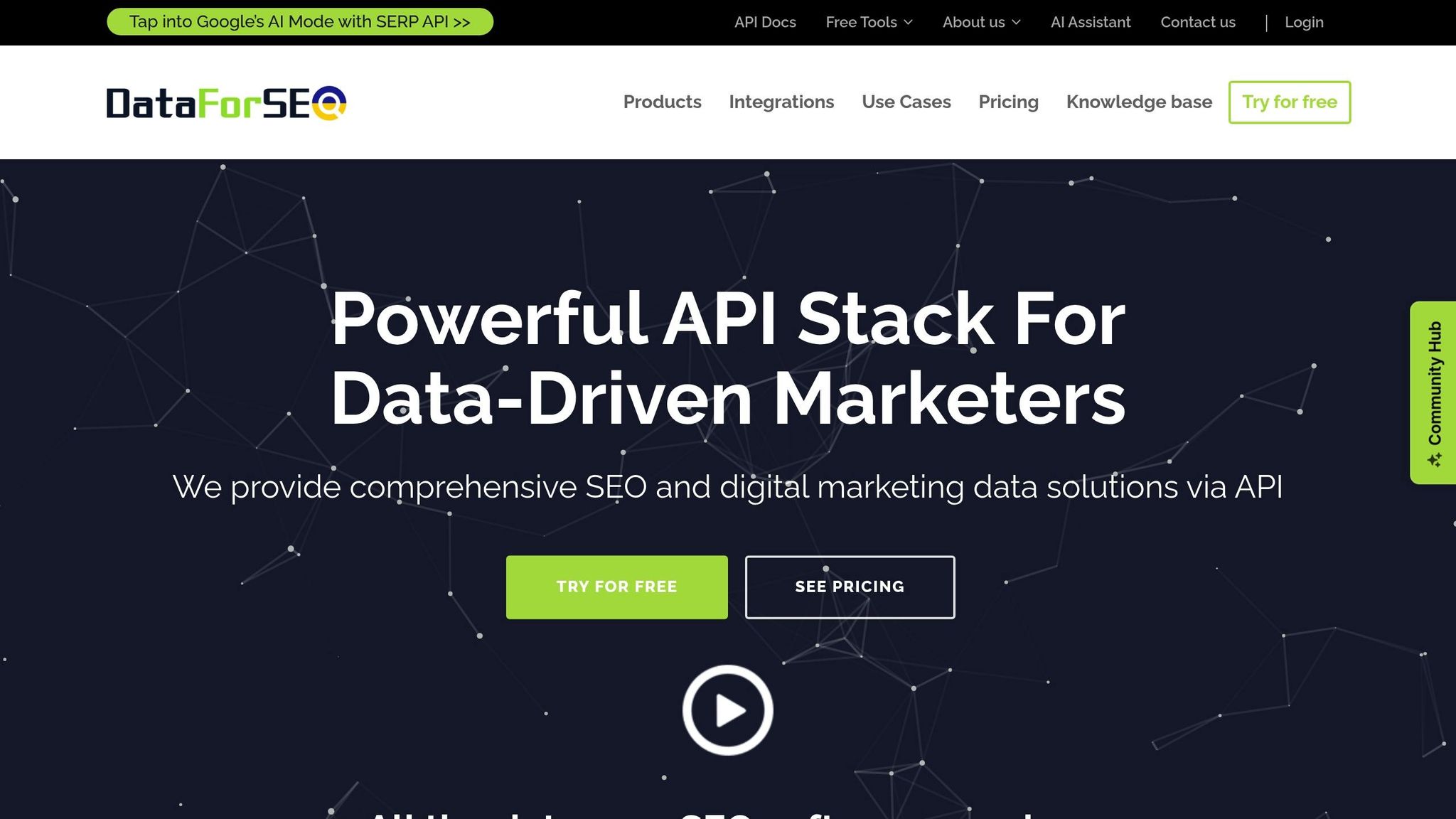
DataForSEO offers a flexible pay-as-you-go pricing model, making it an attractive option for those looking to avoid hefty monthly fees. Unlike Ahrefs, which requires a significant annual investment, DataForSEO allows you to start with as little as $50, paying only for the data you actually use.
API Pricing Model
With a $50 minimum top-up that never expires, you have full control over your spending.
"With DataForSEO you pay only for the individual services you consume. Our pay‐as‐you‐go pricing model is designed to help our customers minimize costs, increase resource efficiency, and build operational resilience."
The pricing structure gets even better with higher usage. For example, spending between $50 and $1,000 gives you 1,000 credits per dollar (about $0.001 per credit). If you spend over $5,000, the cost drops to approximately $0.00057 per credit.
Here’s a breakdown of individual API costs:
- SERP API: $0.0006 per query for standard queue or $0.002 for real-time queries.
- Backlinks API: $0.02 per request, plus $0.00003 per data row.
- Keywords Data API: Starting at $1.10 per 10,000 keywords. Following keyword research best practices can help maximize the value of these credits.
- Merchant API: $1 per 1,000 products.
This pricing flexibility makes DataForSEO a great fit for businesses of all sizes. Now, let’s look at the variety of API endpoints they offer.
Available API Endpoints
DataForSEO boasts over 15 APIs tailored to meet diverse SEO needs. These include popular options like SERP, Backlinks, Keywords Data, OnPage, and Domain Analytics APIs. For advanced users, tools such as the DataForSEO Labs API support in-depth keyword research, while the Content Analysis API is perfect for refining existing content. They also incorporate cutting-edge technology with APIs like AI Optimization and Content Generation.
Specialized endpoints such as the Business Data API, Reviews API, Social Media API, App Data API, and Merchant API expand beyond SEO, offering insights into broader digital marketing strategies.
Data Limits/Quotas
To balance performance and cost, DataForSEO enforces reasonable rate limits. Most APIs allow up to 2,000 requests per minute, and heavier endpoints like the Backlinks API and DataForSEO Labs API have a cap of 30 simultaneous requests. Task management is highly adaptable - you can submit up to 100 tasks per request. Results are stored as JSON for 30 days and raw HTML for 7 days.
It’s worth noting that the Backlinks API requires a $100 monthly top-up, but this credit can be used across any of DataForSEO’s APIs.
Key Features
-
Cost Management Tools: Features like budget monitoring, spending limits, and usage tracking help keep expenses in check. Users can also set a
max_crawl_pagesparameter to control data retrieval. - Flexible Data Retrieval: Choose between real-time data for instant results (at a slightly higher price) or standard queue processing for more affordable, slightly delayed access.
- Data Storage Options: Cached results remain available for up to 30 days, reducing the need to repurchase the same data if freshness isn’t a priority.
- Hassle-Free Setup: DataForSEO handles all infrastructure, so there’s no need for manual proxy configuration or SSL certificate management.
With its combination of flexible pricing, comprehensive APIs, and user-friendly features, DataForSEO is a versatile option for businesses looking to streamline their SEO efforts.
2. SE Ranking
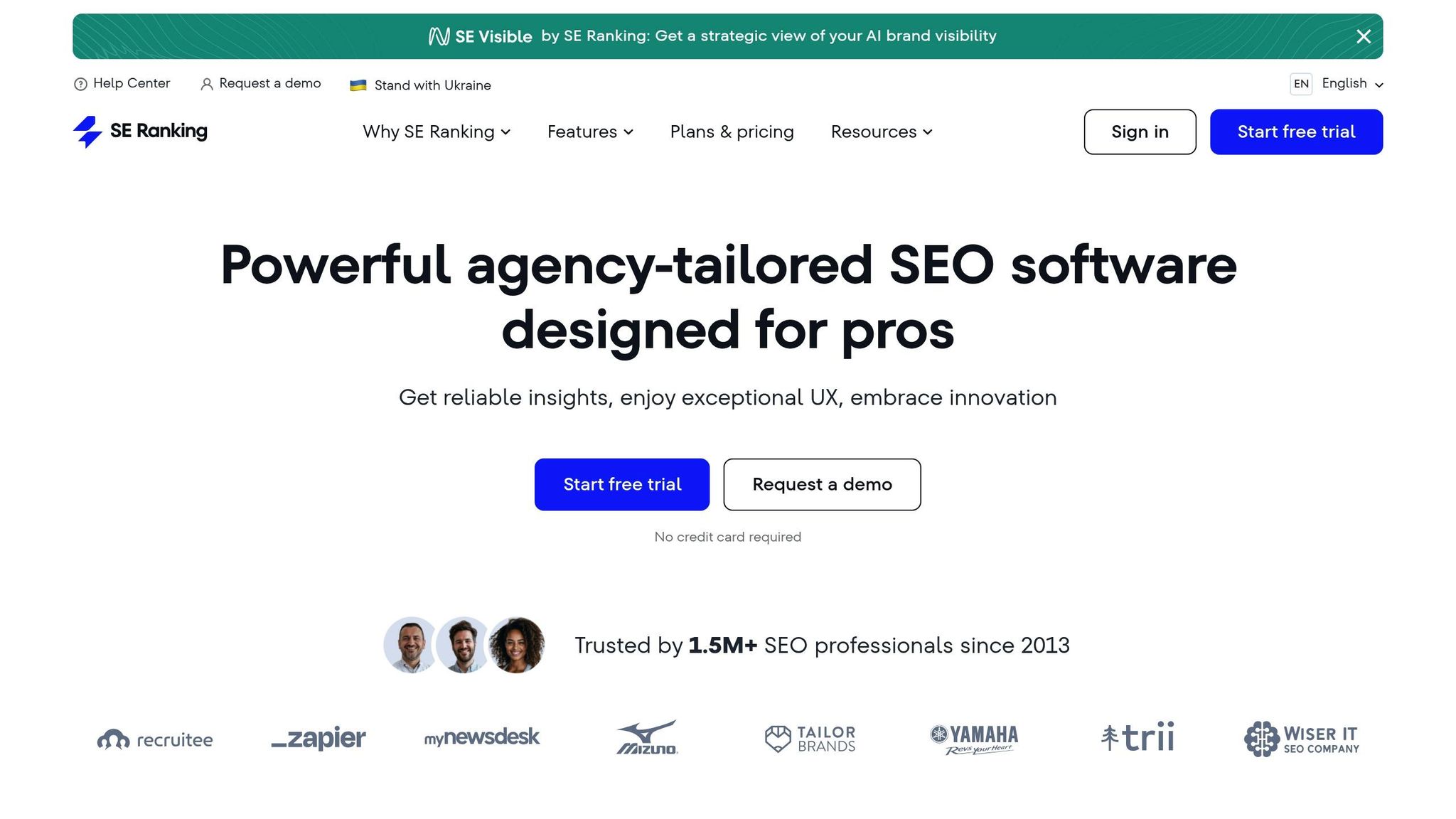
SE Ranking stands out with its credit-based pricing system, offering a clear and predictable cost structure. Unlike flat-rate models, this approach ensures flexibility while providing both standalone API access and integration options for current SE Ranking subscribers.
API Pricing Model
SE Ranking's API pricing revolves around a monthly credit allocation system. Plans begin at 1 million credits for $149/month (or $119.20/month with an annual subscription) and scale up to 500 million credits. A 14-day trial is available, which includes 100,000 free credits to get started.
The number of credits deducted depends on the complexity of the API call. For instance:
- Simple SERP requests cost 10 credits per call.
- Domain overview calls require 100 credits.
- Backlink queries consume 1 credit per record returned.
- More complex tasks, like LLM-related requests, use 1,000 credits per call.
Let’s take a closer look at the API endpoints that leverage this credit-based system.
Available API Endpoints
SE Ranking organizes its API into two primary categories:
-
Data API: This provides access to an extensive database of 5.4 billion keywords and 2.2 billion domain profiles across 188+ countries and regions. Key endpoints include:
- Keyword Research API: Offers insights like search volume, difficulty scores, CPC data, and seasonal trends.
- Backlinks API: Monitors link profiles, tracking new and lost links, anchor texts, and authority metrics.
- Domain Analysis API: Analyzes competitor performance with organic and paid keyword data, traffic estimates, and ranking histories dating back to February 2020.
- SERP Data API: Retrieves real-time top 100 search results for any keyword and location.
- Website Audit API: Conducts detailed SEO audits, generating structured reports on technical health and performance.
- Project API: Designed for managing SE Ranking projects programmatically. This includes setting up keyword tracking, monitoring competitors, and scheduling automated audits.
Data Limits/Quotas
SE Ranking enforces rate limits to ensure smooth operation:
- Data API: Up to 10 requests per second.
- Project API: Up to 5 requests per second.
Exceeding these limits triggers HTTP 429 errors, with repeated violations leading to temporary access restrictions.
Credits are deducted per request, and any overages are billed at the end of the billing cycle. If credits are depleted, users will encounter an HTTP 400 "Insufficient funds" error, pausing API access until the next cycle begins.
Additional limits include:
- Keyword volume checks: Restricted to 10 keywords per call via the system endpoint.
- Rank tracking: Supports up to 15,000 keywords, depending on the selected plan.
Key Features
SE Ranking prioritizes ease of integration for developers, offering detailed documentation, Postman collections, and ready-to-use endpoint examples. All API responses are formatted in structured JSON, making it simple to integrate with BI tools or custom dashboards.
The platform’s geographic reach is another highlight, with data available from 188+ regional databases, enabling both global and localized analyses. Historical performance data, dating back to February 2020, provides useful insights into long-term trends. Agencies benefit from white-label reporting options, while real-time insights and automation features streamline SEO workflows. The system supports data from Google, Bing, and Yahoo.
"We selected SE Ranking's API because it offered a full-featured suite of products. Although we currently use the API for technical audits, we envision leveraging other products in the future. It has cost-effective pricing with flexible usage models and allows us to extract only the data we need without excess clutter. Good customer support was another key factor in switching to SE Ranking."
– Adam Heitzman, Co-Founder and Managing Partner, HigherVisibility
3. Majestic
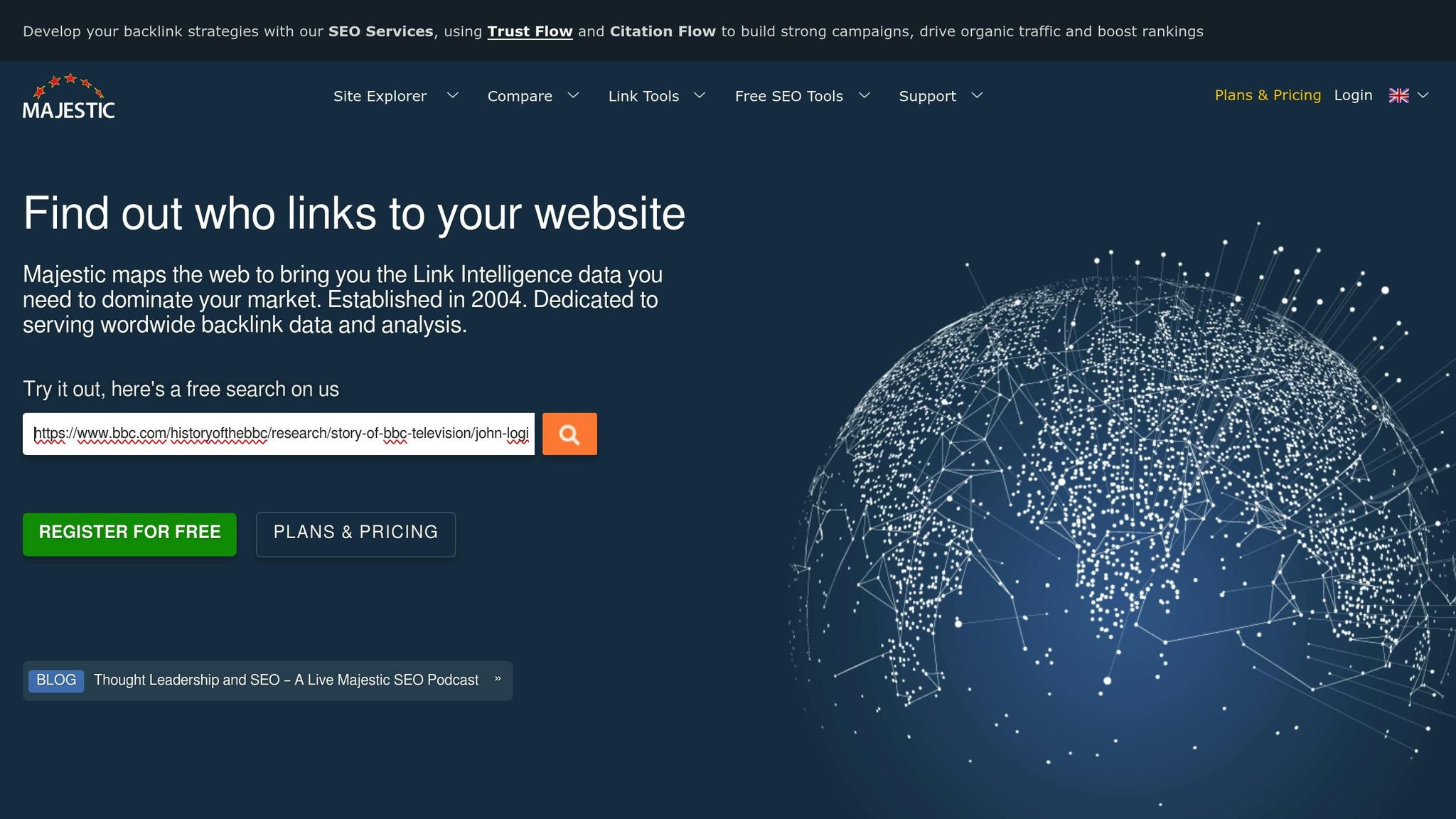
Majestic stands out as a strong contender among API alternatives, offering a unique pricing model and a robust suite of tools for backlink analysis. Unlike some competitors, Majestic provides API access exclusively through its dedicated API Plan, making it a premium choice for those who need detailed data and advanced features.
API Pricing Model
Majestic's API Plan is priced at $399.99 per month if paid monthly or $3,999.90 annually, which breaks down to $333.33 per month for yearly billing. This flat-rate plan supports up to five users, making it a practical option for agencies and developers who require extensive backlink data without the higher costs associated with Ahrefs.
Available API Endpoints
The API grants full access to Majestic's powerful backlink analysis tools. This includes the Site Explorer Link Analysis Suite, which provides detailed backlink data along with metrics like Trust Flow and Citation Flow. It also supports bulk domain analysis, enabling users to process large datasets efficiently. Additionally, Majestic allows users to create custom third-party OpenApps, offering flexibility to tailor the platform's functionality to specific business requirements.
Data Limits and Quotas
Majestic's API Plan is designed to handle enterprise-level demands, offering generous data allowances. Subscribers receive 100 million API analysis units, 20 million retrieval units, and 500,000 index item units monthly. Each search includes 50,000 Site Explorer rows, 50,000 analysis depth resources, and 950 report units per month. These limits make it well-suited for agencies managing high volumes of backlink data.
Key Features
The API Plan includes all the features available in Majestic's Pro subscription, along with additional advanced tools. Highlights include:
- Historic Index: Access crawl data dating back to 2006.
- Index Merger: Combine multiple datasets for deeper insights.
- Clique Hunter: Identify link networks with ease.
- Backlink History Tracking: Monitor changes in backlink profiles over time.
- Flow Metric History: Track shifts in authority metrics.
- Custom Reporting: Generate tailored reports to meet specific needs.
- Integration with Google Search Console: Enhance rank tracking and analysis.
Other features include raw data exports for custom analysis, email alerts, and tools like Search Explorer and Network Neighborhood analysis, which provide a comprehensive view of backlink networks. This combination of tools and flexibility makes Majestic an appealing option for businesses focused on detailed backlink strategies.
4. Semrush
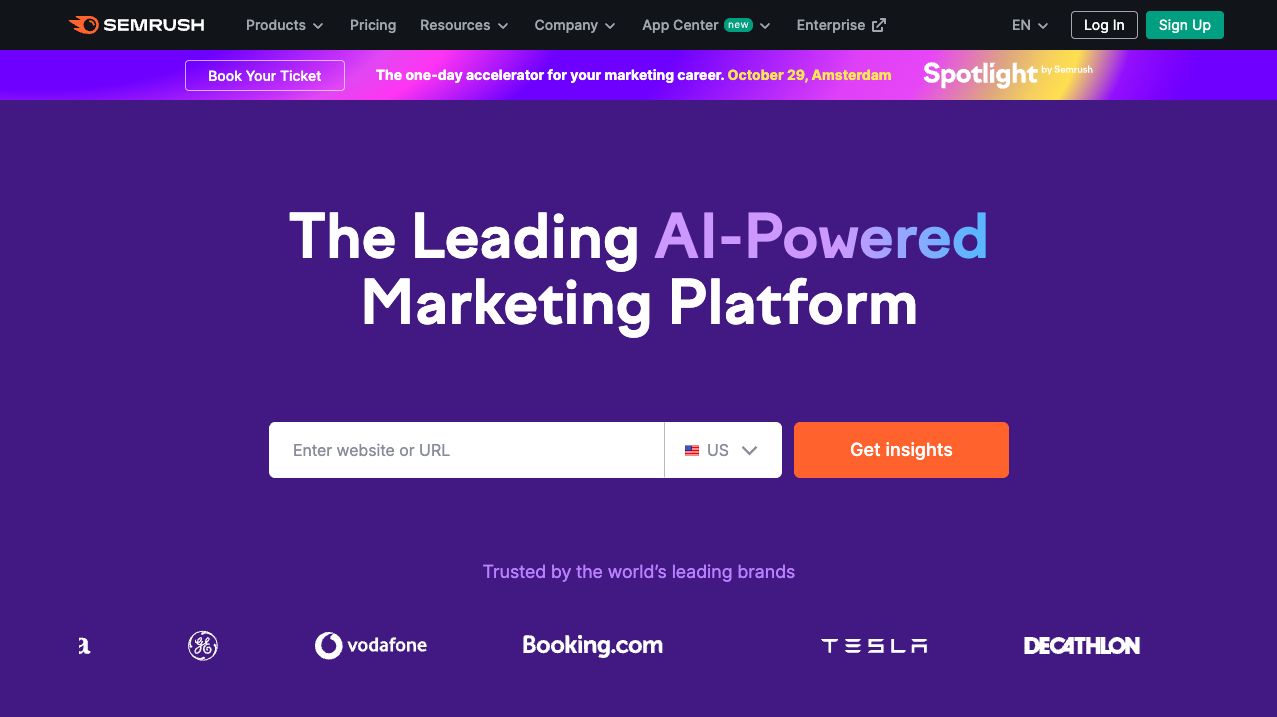
Semrush takes a different approach to API access compared to flat-rate plans like those offered by Majestic. It uses a hybrid model that combines a Business subscription with the purchase of additional API units. This setup means users must not only maintain a Business subscription but also buy API units separately, making it a premium choice that requires thoughtful budgeting and planning.
API Pricing Model
To access Semrush's API, you need a Business subscription, which costs $499.95 per month and acts as a baseline for API functionality. However, having this subscription alone doesn’t grant API access - you’ll also need to purchase API units as an add-on. These units range in price from $20 to $250 per 1 million API units, depending on the quantity purchased.
Unused API units don’t roll over and expire at the end of each month, so businesses with fluctuating data needs must plan their usage carefully to avoid waste.
Available API Endpoints
Semrush provides several API services tailored to different needs. The Analytics API and Projects API are part of the Standard API package, offering tools for keyword research, domain analysis, and competitive intelligence.
The Trends API functions independently and comes with Basic and Premium plans. It allows for 10,000 requests per month by default without consuming Standard API units. For local SEO, the Listing Management API is available to Local Pro and Business plan users, while the Map Rank Tracker API offers rank tracking features to all Semrush users without requiring extra unit purchases.
Data Limits and Quotas
Semrush enforces several restrictions that can affect large-scale operations. Request rates are capped at 10 requests per second and 10 concurrent requests. While these measures protect system stability, they can slow down bulk data retrieval.
The cost of using the Standard API varies depending on the type of request. Some reports charge per line of data returned, while others use a fixed cost per request. This variability makes it tricky to accurately predict costs for large data pulls. If you run out of API units, the system will return specific error codes: ERROR 132 for API v3 or 403 errors for API v4.
| API Type | Subscription Required | Unit Consumption | Rate Limits | Monthly Limits |
|---|---|---|---|---|
| Standard API | Business + Units | Per line/request | 10 req/sec, 10 concurrent | Based on units purchased |
| Trends API | Paid Semrush account | No units required | 10 req/sec per user | 10,000 requests (default) |
| Listing Management | Local Pro/Business | No units required | 5 req/sec (updates) | No specific limit |
| Map Rank Tracker | Any Semrush plan | No units required | No specific limit | No specific limit |
These limits and requirements highlight the complexity of Semrush's API system.
Key Features
Semrush supports both legacy (v3) and modern (v4) API versions, with v4 using OAuth 2.0 for improved security. Users can monitor their API unit balance either through free API requests or directly in the Semrush dashboard.
One notable limitation is data caching, which is restricted to one month unless you obtain written consent from Semrush. This can be a hurdle for applications that require long-term storage of historical data. On the other hand, the Trends API is more accommodating for high-volume users, allowing daily and hourly limits of 20,000 requests once monthly usage exceeds 20,000 requests.
For businesses handling large-scale SEO tasks, the unit consumption model demands strategic use of resources. Tasks like historical data retrieval or comprehensive keyword analysis across multiple domains can quickly drain API units, making efficient cost management essential for long-term use.
sbb-itb-b8bc310
5. Mangools
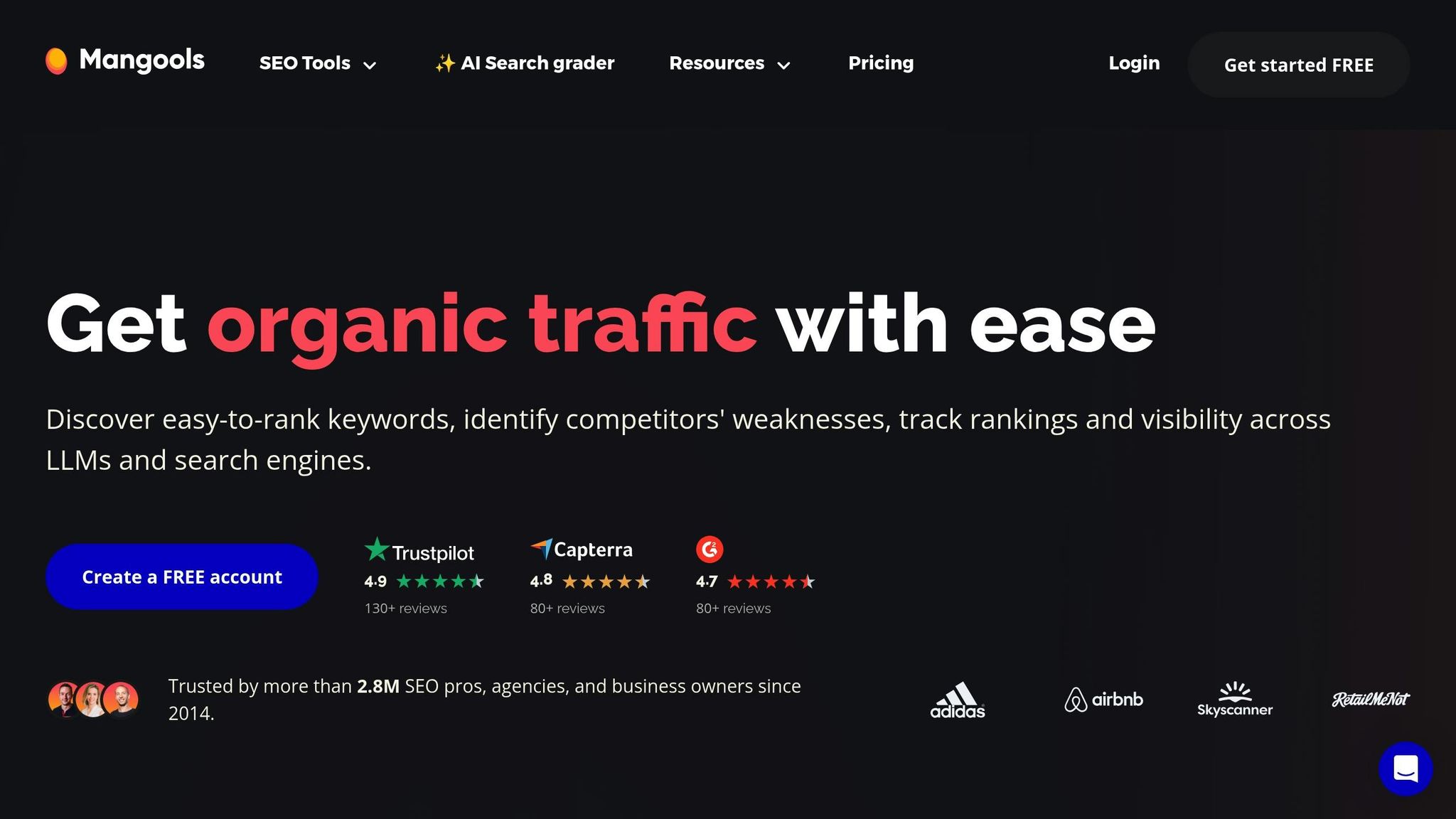
If you're looking for API access that aligns with your subscription plan and don't mind a bit of a personalized pricing process, Mangools might be worth considering. Instead of public pricing tiers, Mangools uses a request-based system tied directly to its standard subscription plans (Basic, Premium, Agency). This means your API usage is subject to the same daily and monthly limits as the web interface. Here's a breakdown of what you can expect from Mangools' API, including endpoints, pricing, and usage limits.
API Pricing Model
One thing that sets the Mangools API apart is its non-public pricing structure. To get access, you'll need to fill out a contact form to receive the pricing details and documentation. While this personalized approach might work for some, it makes comparing costs with other providers tricky until you've gone through the inquiry process.
Available API Endpoints
Mangools' API uses an x-access-token for authentication in the request header. Below are the key endpoints available:
KWFinder Endpoints
-
/kwfinder/related-keywords: Returns up to 700 relevant keywords with data like CPC, PPC, keyword difficulty, and 12-month average search volume. -
/kwfinder/competitor-keywords: Provides up to 2,000 global keywords or 1,000 location-specific ones. -
/kwfinder/keyword-imports: Lets you import up to 700 keywords at once to fetch detailed metrics.
SERPChecker Endpoints
/serpchecker/serps: Offers detailed search result data, including organic and paid results, rich snippets, click-through rates for each position, and 50 SEO metrics from sources like Moz and Majestic.
LinkMiner Endpoints
/linkminer/links: Delivers backlink data for specified URLs or domains, with pagination options for up to 500 backlinks per page. Filters are available for source types.
SiteProfiler Endpoints
/siteprofiler/overview: Provides domain and URL-level metrics.
Data Limits and Quotas
API requests are tied to your subscription plan's limits, and Mangools employs a 24-hour caching mechanism to prevent duplicate charges for identical requests within that time frame. However, the subscription-based usage caps can pose challenges for businesses with high-volume needs. For instance:
- KWFinder endpoints reduce your "Keyword lookups" quota.
- SERPChecker requests count against "SERP lookups" limits.
These restrictions can make lower-tier plans less efficient for companies experiencing growth or requiring significant data processing.
Key Features
Mangools' 24-hour caching mechanism is a helpful feature, ensuring you won’t be charged multiple times for identical requests within a day. However, since API usage is tied to subscription quotas, heavy users may find themselves quickly hitting those limits. This setup may not be ideal for businesses with large-scale data needs or high-volume workflows.
6. Moz
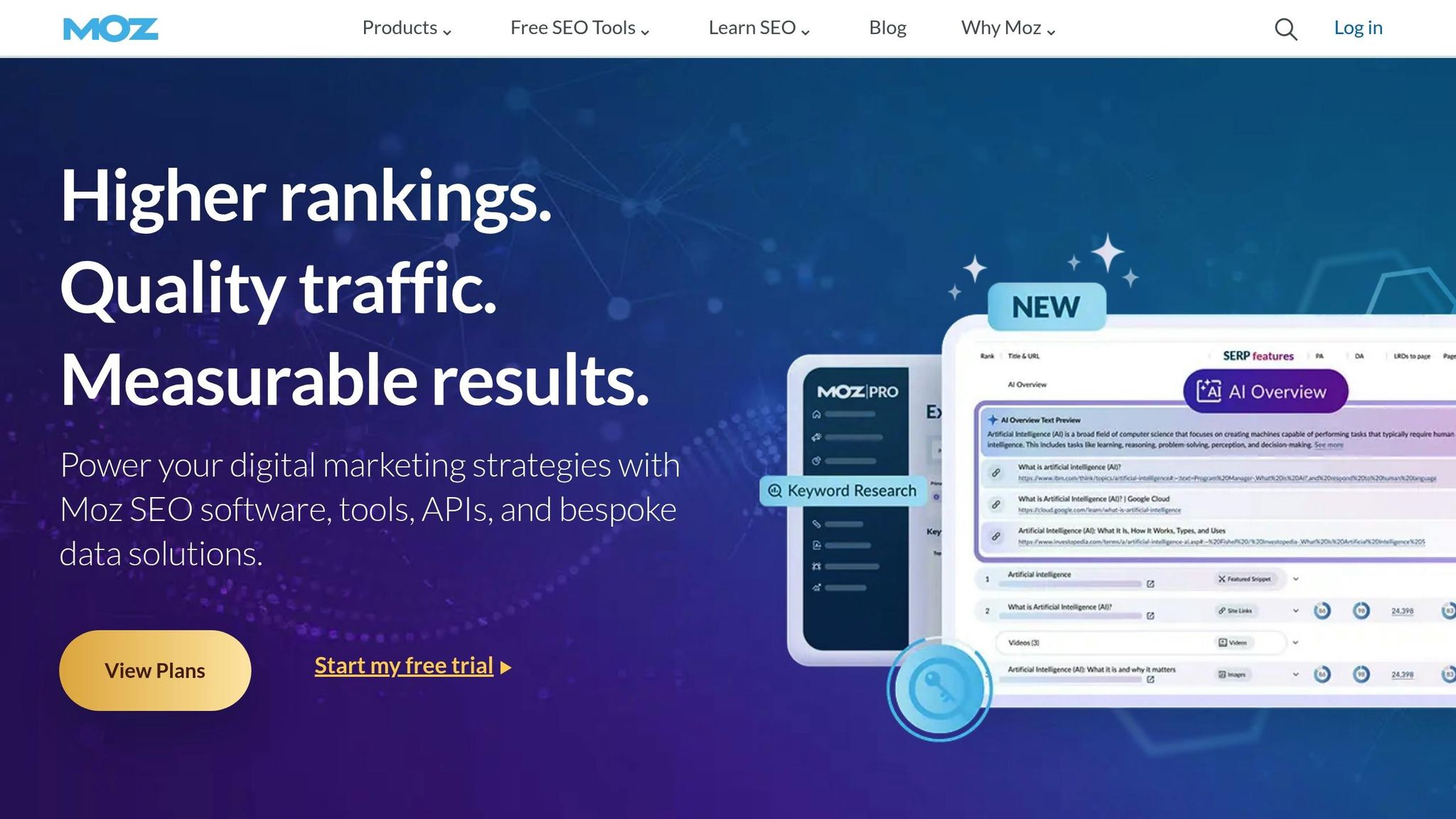
Moz stands out with its straightforward and affordable API pricing. Unlike competitors that often lock features behind costly enterprise plans, Moz's API starts at just $5 per month and even includes a free tier. This makes it a solid choice for small businesses and individual SEO professionals who need reliable data without overspending.
API Pricing Model
Moz takes a flexible approach to pricing, offering a tiered, usage-based model. It starts with a free plan (50 rows per month, one request every ten seconds, valid credit card required) and scales up to paid options beginning at $5 per month. For larger needs, enterprise-level plans reach up to $10,000 per month, accommodating 40 million rows.
A standout feature is Moz's no-overage policy, which ensures there are no surprise charges on the free plan. Paid plans are equally user-friendly, allowing upgrades, downgrades, or cancellations directly through the Moz API dashboard, giving users full control over their spending.
Available API Endpoints
Moz's API operates on a JSON-RPC 2.0 architecture, using a single universal endpoint (https://api.moz.com/jsonrpc) accessed via HTTP POST requests. Authentication is managed through a single API token passed in the x-moz-token header.
The API offers a wide range of tools for keyword research, backlink analysis, and competitive intelligence. Some key endpoints include:
- URL Metrics: For bulk checks on Domain Authority and Page Authority.
- Links: Backlink analysis to evaluate link-building opportunities.
- Brand Authority: Measures brand presence in search results.
- Keyword Metrics: Delivers search volume and difficulty data.
- Ranking Keywords: Shows keywords any page ranks for in Google’s top 50 results.
One of the standout features is the Search Intent endpoint, which uses AI to classify keywords into categories like informational, navigational, commercial, or transactional. This helps users better understand the intent behind searches. Moz's data is sourced from an extensive dataset, including 45.5 trillion links across 1 billion domains and 1.25 billion monthly keyword volumes.
Data Limits and Quotas
Moz manages usage through quotas measured in "rows", with each row typically representing one object in a response. Users can track their usage in real-time using the quota.lookup method. Beta methods are also available for users on Starter Medium plans or higher, though these draw from a separate quota and may change without notice.
Currently, the API is not versioned, meaning users don’t have to worry about breaking changes except for beta endpoints. However, some older link and site-related endpoints are only accessible through legacy documentation. These clear limits and guidelines support Moz’s robust feature set.
Key Features
Moz's API is praised by industry professionals for its reliability, affordability, and ability to handle bulk data retrieval efficiently. For example, Roger Frost from Intero Digital highlights its dependability for bulk Domain Authority data, while SEO consultant Michael Cottam points out the cost savings compared to Ahrefs. Kane Jamison also emphasizes its excellent value for comprehensive link analysis.
The API is backed by detailed documentation, quickstart guides, and 24/7 online support. Additionally, Moz plans to release SDKs for popular programming languages to simplify integration further. For agencies and large-scale operations, the Spam Score metric has been particularly helpful in assessing link quality. Mike King from iPullRank shared:
"Moz metrics like Spam Score help us drive effective results day in and day out."
Moz’s API strikes a balance between affordability and rich data, making it a compelling alternative to pricier options like Ahrefs.
7. SpyFu
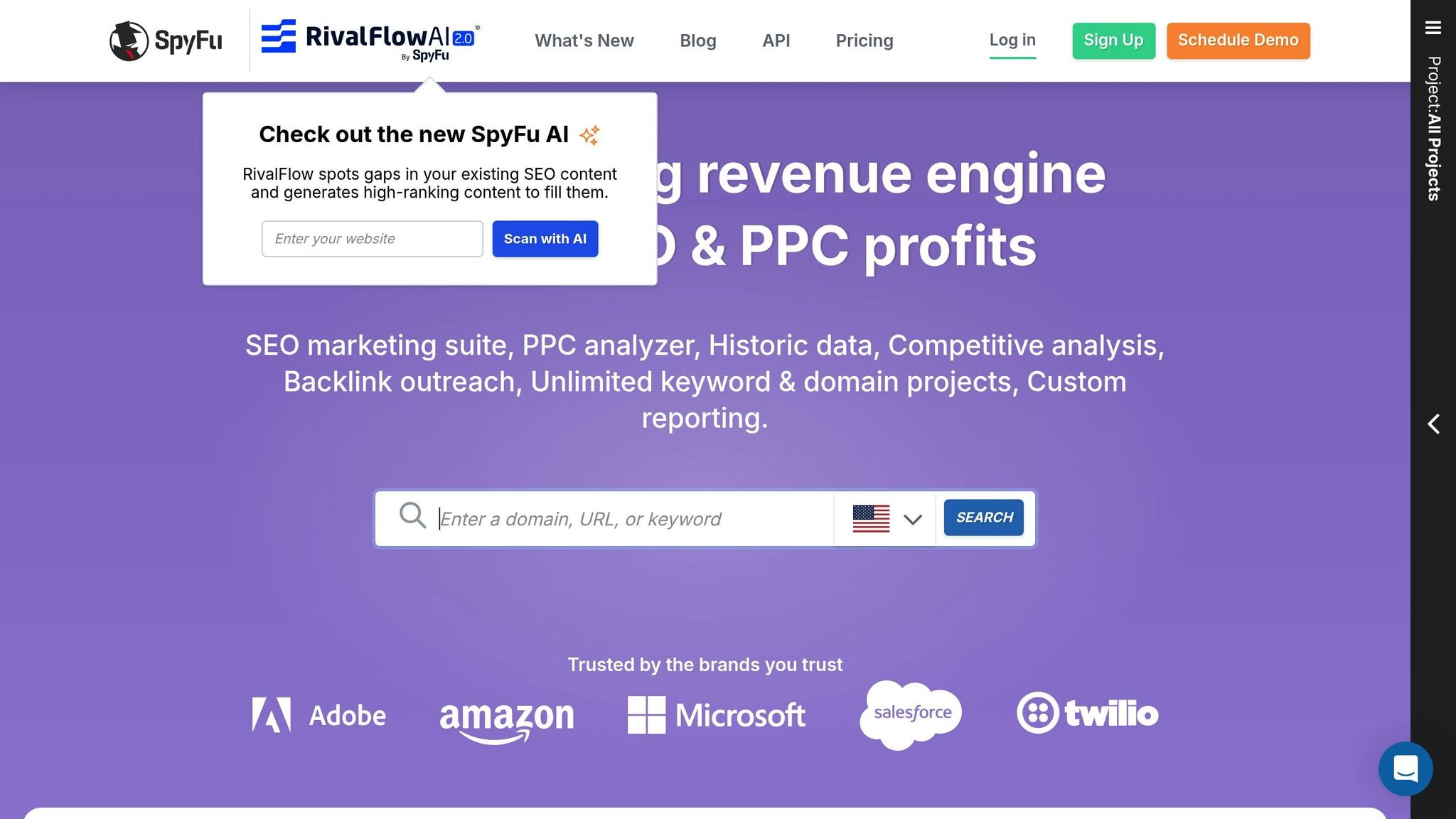
SpyFu is another strong option for those seeking affordable API solutions, offering a mix of competitive intelligence tools and a deep archive of historical SERP data. With over a decade’s worth of data, SpyFu provides a noteworthy alternative to the Ahrefs API. However, API access is only available with its Professional plan.
API Pricing Model
To access SpyFu's API, you'll need to subscribe to the Professional plan, which costs $79 per month if billed monthly. Opting for an annual subscription lowers the cost to $58 per month. Keep in mind that the lower-tier Basic plan, priced at $39 per month (or $33 per month annually), does not include API access.
Available API Endpoints
SpyFu's API offers eight specialized endpoints tailored for competitive intelligence and PPC research:
- Ad History Research API: Provides historical data on advertising campaigns.
- Ranking History Research API: Tracks long-term organic ranking trends.
- PPC Research API: Delivers insights into pay-per-click campaigns and competitor strategies.
- SEO Research API: Offers metrics on organic search performance.
- Competitors API: Identifies and analyzes direct competitors.
- Keyword Research API: Supplies data on search volume and keyword difficulty.
- Kombat API: Enables head-to-head comparisons of competitors.
- Domain Stats API: Measures overall domain performance.
These endpoints are designed to support a wide range of SEO and PPC analysis needs, making the API versatile for businesses and developers alike.
Data Limits and Quotas
The Professional plan comes with generous data allowances. Users benefit from unlimited search results and data exports. Additionally, the plan includes tracking for 15,000 keyword rankings per week and grants access to over 10 years of historical data. This makes it an excellent choice for those looking to conduct in-depth trend analysis or long-term competitive research.
Key Features
What sets SpyFu's API apart is its emphasis on competitive intelligence and its extensive historical data. With over a decade of SERP information, the API provides tools to analyze PPC campaigns, track rankings, and assess keyword performance. Developers can seamlessly integrate SpyFu’s capabilities into their own applications, automating tasks like data retrieval and competitor monitoring. The Domain Stats API further enhances its utility by offering insights into overall domain performance, making it a well-rounded solution for businesses juggling both SEO and paid search efforts.
SpyFu’s combination of historical data and competitive insights makes it a valuable resource in the API landscape.
Best Ahrefs API alternatives compared
Comparison Table
Choosing the right platform depends on your budget, technical needs, and the type of data you require. Each option comes with its own strengths and limitations, which can help you determine the best fit for your goals.
| Platform | Pricing Model | Key Advantages | Main Limitations | Best For |
|---|---|---|---|---|
| DataForSEO | Pay-as-you-go, $50 minimum | Wide API suite with 15+ endpoints and flexible, commitment-free pricing | Higher costs for large-scale usage; requires usage monitoring | Developers needing diverse data and flexible billing |
| SE Ranking | $149/mo or $119.20/mo annual | Fixed pricing with multiple SEO API endpoints | Limited to SEO endpoints | Small to medium agencies with predictable usage |
| Majestic | $49.99 - $399.99/mo | Strong backlink analysis, historical data since 2006, and excellent link intelligence | Focused mainly on link data with limited keyword research | Businesses prioritizing backlink analysis |
| Semrush | $499/mo or $416.66/mo annual | Comprehensive market data and analytics suite | High entry cost; requires Business subscription for API access | Large enterprises needing broad market insights |
| Mangools | Unknown (request access) | API access to KWFinder and SERPchecker tools | Lack of pricing transparency; restricted API availability | Users already familiar with Mangools' tools |
| Moz | $0 - $10,000/mo | Flexible tiered pricing, generous free tier (50 rows/month), scalable options | Limited data rows on lower-tier plans | Startups and small businesses exploring APIs |
| SpyFu | $79/mo or $58/mo annual | 19 years of historical SERP data and strong competitive intelligence | Focused mainly on competitive research | Businesses focused on competitor and PPC analysis |
Key Considerations
When comparing these platforms, the breadth of data they provide is a major factor. DataForSEO stands out with over 15 APIs covering a wide range of data, from SERP insights to social media analytics. These tools are also effective for identifying content gaps in your strategy. Semrush and SpyFu excel in competitive intelligence, while Majestic is an excellent choice for those who need in-depth backlink analysis, thanks to its historical data that goes back to 2006.
Pricing models also play a critical role. For consistent usage, SE Ranking offers predictable costs at $119.20 per month when billed annually. On the other hand, DataForSEO's pay-as-you-go model ensures you only pay for what you use, which can be ideal for projects with fluctuating demands. Moz provides an accessible entry point with its free tier, making it a great option for testing API functionality.
Ease of integration varies as well. Platforms like Moz and SE Ranking offer straightforward setups, while DataForSEO's extensive range of endpoints may require more technical expertise. For PPC professionals, SpyFu's competitive intelligence is particularly valuable, though it may not cater as effectively to broader SEO needs. Meanwhile, Semrush delivers comprehensive global market data, and Majestic remains a top choice for businesses focused on backlink research.
How to choose the right API alternative
- Data needs: Backlinks only, or also keywords/SERP, technical, reviews, merchant, and social data?
- Freshness and coverage: Index size, update frequency, historical depth
- Pricing model: Pay‑as‑you‑go vs. bundles; per‑request vs. unit‑based
- Rate limits: Concurrency, daily caps, minimum cost per call
- Integration effort: SDKs, examples, retries, webhook support
- Compliance: Data sourcing transparency and ToS alignment
FAQs
Does Ahrefs have an API?
Yes. API v3 is available to Enterprise customers only.
What is Ahrefs API pricing/cost/price?
$1,499/month with an annual commitment for Enterprise, plus optional pay‑as‑you‑go add‑on units.
What is Ahrefs API v3?
The current generation of Ahrefs’ programmatic API that exposes datasets like backlinks, domain/page metrics, and SERP/keyword insights.
How do I get an Ahrefs API key/token?
Subscribe to Enterprise, enable API access in your account, then generate an API key/token in the API area. Use it in request headers per docs.
Are there Ahrefs API rate limits?
Yes. Requests consume API units (minimum ~50 units per request on most endpoints), with concurrency and endpoint‑specific caps.
Is there an Ahrefs Google Sheets API?
Not a separate product. Use Apps Script or a third‑party connector to call Ahrefs API v3 from Sheets.
Which Ahrefs API alternative is cheapest?
Pay‑as‑you‑go providers like DataForSEO let you start with a $50 top‑up and pay per request - ideal for small, targeted workloads.
When is the Ahrefs API worth it?
If you already need Enterprise features, large unit volumes, and guaranteed data consistency across teams and systems.